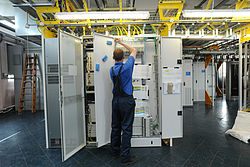
Back بدالة هاتف Arabic Телефонна централа Bulgarian Central de commutació Catalan Telefonní ústředna Czech Telefoncentral Danish Vermittlungsstelle German Telefoncentralo Esperanto Central telefónica Spanish تلفنخانه Persian Puhelinkeskus Finnish


A telephone exchange, also known as a telephone switch or central office, is a crucial component in the public switched telephone network (PSTN) or large enterprise telecommunications systems. It facilitates the interconnection of telephone subscriber lines or digital system virtual circuits, enabling telephone calls between subscribers.
The terminology used in telecommunications has evolved over time, with telephone exchange and central office often used interchangeably, the latter term originating from the Bell System. A central office typically refers to a facility that houses the inside plant equipment for one or several telephone exchanges, each catering to a specific geographical region. This region is sometimes known as the exchange area. In North America, the term wire center may be used to denote a central office location, indicating a facility that provides a telephone with a dial tone.[1] Telecommunication carriers also define rate centers for business and billing purposes, which in large cities, might encompass clusters of central offices to specify geographic locations for distance measurement calculations.
In the 1940s, the Bell System in the United States and Canada introduced a nationwide numbering system that identified central offices with a unique three-digit code, along with a three-digit numbering plan area code (NPA code or area code), making central office codes distinctive within each numbering plan area. These codes served as prefixes in subscriber telephone numbers. The mid-20th century saw similar organizational efforts in telephone networks globally, propelled by the advent of international and transoceanic telephone trunks and direct customer dialing.
For corporate or enterprise applications, a private telephone exchange is termed a private branch exchange (PBX), which connects to the public switched telephone network. A PBX serves an organization's telephones and any private leased line circuits, typically situated in large office spaces or organizational campuses. Smaller setups might use a PBX or key telephone system managed by a receptionist, catering to the telecommunication needs of the enterprise.
- ^ "General Definitions". Verizon service. Verizon Enterprise Solutions.
© MMXXIII Rich X Search. We shall prevail. All rights reserved. Rich X Search